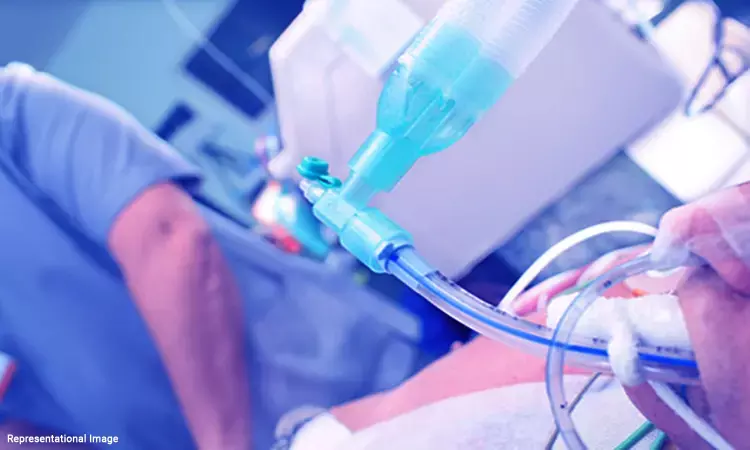- Home
- Medical news & Guidelines
- Anesthesiology
- Cardiology and CTVS
- Critical Care
- Dentistry
- Dermatology
- Diabetes and Endocrinology
- ENT
- Gastroenterology
- Medicine
- Nephrology
- Neurology
- Obstretics-Gynaecology
- Oncology
- Ophthalmology
- Orthopaedics
- Pediatrics-Neonatology
- Psychiatry
- Pulmonology
- Radiology
- Surgery
- Urology
- Laboratory Medicine
- Diet
- Nursing
- Paramedical
- Physiotherapy
- Health news
- Fact Check
- Bone Health Fact Check
- Brain Health Fact Check
- Cancer Related Fact Check
- Child Care Fact Check
- Dental and oral health fact check
- Diabetes and metabolic health fact check
- Diet and Nutrition Fact Check
- Eye and ENT Care Fact Check
- Fitness fact check
- Gut health fact check
- Heart health fact check
- Kidney health fact check
- Medical education fact check
- Men's health fact check
- Respiratory fact check
- Skin and hair care fact check
- Vaccine and Immunization fact check
- Women's health fact check
- AYUSH
- State News
- Andaman and Nicobar Islands
- Andhra Pradesh
- Arunachal Pradesh
- Assam
- Bihar
- Chandigarh
- Chattisgarh
- Dadra and Nagar Haveli
- Daman and Diu
- Delhi
- Goa
- Gujarat
- Haryana
- Himachal Pradesh
- Jammu & Kashmir
- Jharkhand
- Karnataka
- Kerala
- Ladakh
- Lakshadweep
- Madhya Pradesh
- Maharashtra
- Manipur
- Meghalaya
- Mizoram
- Nagaland
- Odisha
- Puducherry
- Punjab
- Rajasthan
- Sikkim
- Tamil Nadu
- Telangana
- Tripura
- Uttar Pradesh
- Uttrakhand
- West Bengal
- Medical Education
- Industry
Do probiotics help with ventilator associated Pneumonia in Critical Patients?

In a study to determine the effect of probiotic Lactobacillus rhamnosus (L rhamnosus) GG prior to ventilation, it was discovered that administration of the probiotic L rhamnosus GG compared to placebo resulted in no significant difference in the development of ventilator-associated pneumonia in critically ill patients requiring mechanical ventilation.
Rising interest in microbial dysbiosis during critical illness has prompted concerns about the therapeutic potential of probiotic microbiome alteration. Prior randomized studies in this group show that probiotics decrease infection, notably ventilator-associated pneumonia (VAP), however probiotic-associated illnesses have been observed as well.
This study was conducted by Jennie Johnstone and team, with the aim to assess the efficacy of L rhamnosus GG in avoiding VAP, secondary infections, and other clinically significant outcomes in the critical care unit (ICU).
The findings of this study were published in The Journal of the American Medical Association on 21st September, 2021.
This was a randomized placebo-controlled trial, conducted in 44 intensive care units (ICUs) in Canada, the United States, and Saudi Arabia, enrolling people who were expected to require mechanical breathing for at least 72 hours. From October 2013 to March 2019, a total of 2653 patients were enrolled (final follow-up, October 2020). In the ICU, L rhamnosus GG or a placebo was administered twice daily.
The key points highlighted from this study are:
VAP developed in 289 of 1318 probiotic-treated patients vs 284 of 1332 controls. There was no significant difference in any of the 20 prespecified secondary outcomes, including other ICU-acquired infections, diarrhea, antibiotic usage, death, or duration of stay.
The adverse event of L rhamnosus in a sterile location or as the single or predominant organism in a non sterile site occurred in 15 patients taking probiotics vs 1 in the control group.
In conclusion, there is no significant difference in administering probiotic L rhamnosus before ventilation and this study's findings do not support the use of L rhamnosus GG in critically sick patients.
Reference:
Johnstone, J., Meade, M., Lauzier, F., Marshall, J., Duan, E., Dionne, J., Arabi, Y. M., Heels-Ansdell, D., Thabane, L., Lamarche, D., Surette, M., Zytaruk, N., Mehta, S., Dodek, P., McIntyre, L., English, S., Rochwerg, B., Karachi, T., … Henderson, W. (2021). Effect of Probiotics on Incident Ventilator-Associated Pneumonia in Critically Ill Patients. JAMA, 326(11), 1024. https://doi.org/10.1001/jama.2021.13355
Medical Dialogues consists of a team of passionate medical/scientific writers, led by doctors and healthcare researchers. Our team efforts to bring you updated and timely news about the important happenings of the medical and healthcare sector. Our editorial team can be reached at editorial@medicaldialogues.in.
Dr Kamal Kant Kohli-MBBS, DTCD- a chest specialist with more than 30 years of practice and a flair for writing clinical articles, Dr Kamal Kant Kohli joined Medical Dialogues as a Chief Editor of Medical News. Besides writing articles, as an editor, he proofreads and verifies all the medical content published on Medical Dialogues including those coming from journals, studies,medical conferences,guidelines etc. Email: drkohli@medicaldialogues.in. Contact no. 011-43720751


